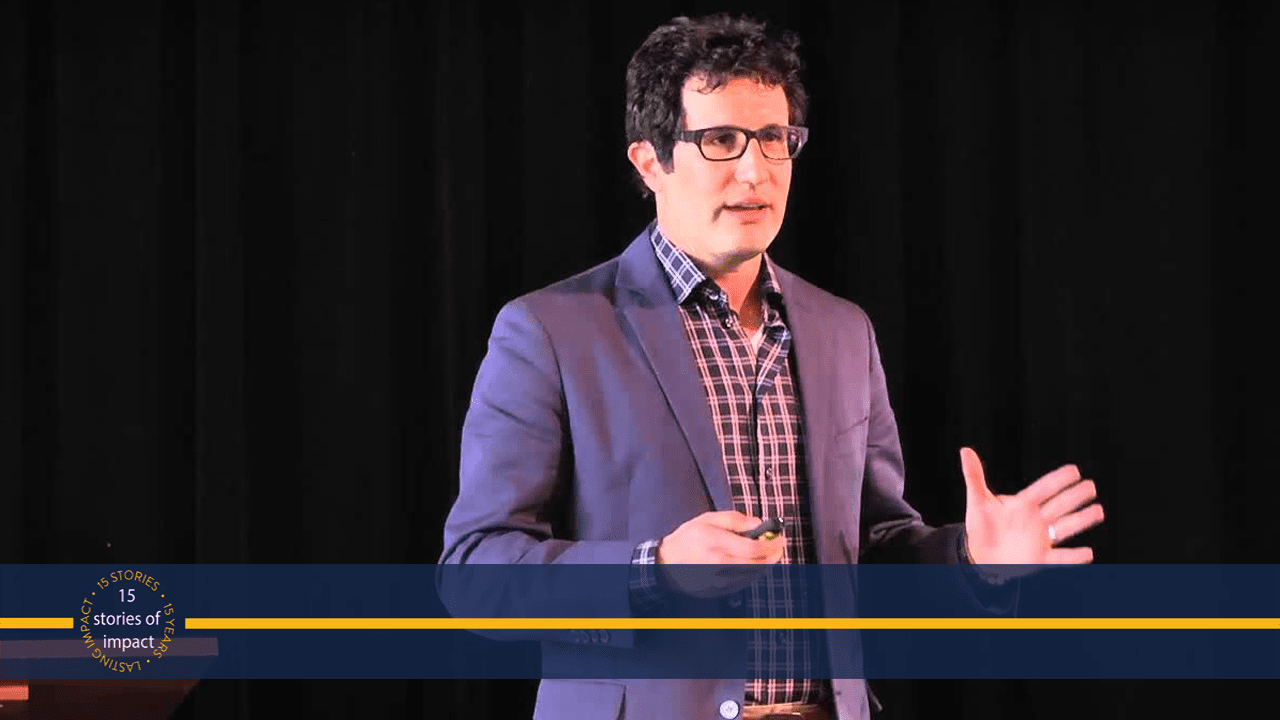Dwight Gaudet, Haas-Columbia MBA ’11, shares highlights from Leading Sustainable Change
 By Dwight Gaudet, Haas-Columbia MBA ’11. Dwight is a CRB Alumni Board member and was a participant in our recent Leading Sustainable Change workshop. He is an experienced business leader dedicated to organizational structure and processes encouraging participatory and collaborative innovation, decision-making and vision formulation.
By Dwight Gaudet, Haas-Columbia MBA ’11. Dwight is a CRB Alumni Board member and was a participant in our recent Leading Sustainable Change workshop. He is an experienced business leader dedicated to organizational structure and processes encouraging participatory and collaborative innovation, decision-making and vision formulation.
T he recent Center for Responsible Business (CRB) sponsored workshop, Leading Sustainable Change, provided a wonderful opportunity to both hear about and experience a variety of the expressions of a growing movement. The movement represents the nexus where corporate social responsibility (CSR), sustainability, leadership, conscious capitalism, and the expanded perspectives available through such things as systems thinking and mindfulness, come together.
he recent Center for Responsible Business (CRB) sponsored workshop, Leading Sustainable Change, provided a wonderful opportunity to both hear about and experience a variety of the expressions of a growing movement. The movement represents the nexus where corporate social responsibility (CSR), sustainability, leadership, conscious capitalism, and the expanded perspectives available through such things as systems thinking and mindfulness, come together.
This cross-discipline integration has been growing for more than two decades, having both broad and deep roots to its origin. It rarely gets the academic attention that it deserves. It is finally appearing on the radar of business schools throughout the country.
CRB has gained considerable national recognition for its efforts in promoting aspects of this movement throughout its 10-year history. Now, along with growing academic awareness and literally hundreds of popular books within the genre, both public and private investment seem to be slowly recognizing that businesses that operate with this approach/philosophy often produce better returns for their shareholders while simultaneously benefiting the rest of their stakeholders – through strengthening economic, social and environmental well-being.
The Leading Sustainable Change workshop touched upon some of the reasons why this trend is rightly being recognized as a leading edge, not a phenomena that can any longer stay relegated to the periphery of either business practice or theory.
Conscious Capitalism
 One of the keynote speakers was Jeff Klein, Director of Conscious Capitalism, Inc. and CEO of Working for Good. Jeff introduced some experiential techniques frequently used in businesses incorporating the principles of conscious capitalism, emphasizing the importance of being aware of the perspective we are each taking in relation to sustainability.
One of the keynote speakers was Jeff Klein, Director of Conscious Capitalism, Inc. and CEO of Working for Good. Jeff introduced some experiential techniques frequently used in businesses incorporating the principles of conscious capitalism, emphasizing the importance of being aware of the perspective we are each taking in relation to sustainability.
 He stressed that increasing awareness of our own perspectives is at the very heart of both individual change and effective leadership.
He stressed that increasing awareness of our own perspectives is at the very heart of both individual change and effective leadership.
Jeff then went on to provide a brief introduction to the principles of Conscious Capitalism, concepts more fully articulated in the recent hot-selling, Conscious Capitalism, by John Mackey and Raj Sisodia.
Free Range Studios: The Importance of Story
 Another highlight was Frankie Ridolfi’s presentation on Business Leaders as Mythmakers. Working with Free Range Studios, the marketing firm behind Story of Stuff, he described their recognition that business, and in many ways our contemporary society, is finding itself without a core unifying story – a myth that supports meaning, motivates and inspires.
Another highlight was Frankie Ridolfi’s presentation on Business Leaders as Mythmakers. Working with Free Range Studios, the marketing firm behind Story of Stuff, he described their recognition that business, and in many ways our contemporary society, is finding itself without a core unifying story – a myth that supports meaning, motivates and inspires.
Using theory developed by Carl Jung and popularized by Joseph Campbell, they suggest that the archetype of the hero’s journey provides an ideal means to express a company’s mission, promote a brand, or market a product, service, or cause. This represents a shift from the “inadequacy marketing” of the past to what they call “empowerment marketing” of the future.
Sara Beckman and Dave Sherman
 Haas Professor Sara Beckman and CRB Alumni Board member Dave Sherman provided a nice integration of academic and practical application of the new ways in which today’s “wicked” problems – characterized by volatility, uncertainty, complexity and ambiguity – need to be framed so as to then be successfully addressed.
Haas Professor Sara Beckman and CRB Alumni Board member Dave Sherman provided a nice integration of academic and practical application of the new ways in which today’s “wicked” problems – characterized by volatility, uncertainty, complexity and ambiguity – need to be framed so as to then be successfully addressed.
Using techniques taken from Appreciative Inquiry and System Dynamics, they stressed the importance of divergent thinking and collaboration in strategic creativity, innovation and vision development. Their segment shared an inspiring glimpse into Sara’s new and well received core curriculum class at Haas – Problem Finding, Problem Solving.


